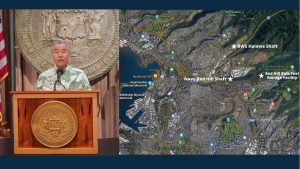From the governor: Hope, challenges for the future
Posted on Dec 30, 2021 in Capitol Connection, Featured, MainJust when we thought we had seen the worst of an already tough year, Hawai‘i has been hit with the Omicron variant and O‘ahu’s challenges with the Navy’s Red Hill fuel tanks. But crisis after crisis, when it mattered most, government agencies and the community found solutions. We forged ahead with the Ige administration’s priorities in health care, housing, education and the environment. Most importantly, we found ways to make progress, in spite of the setbacks. This edition of Capitol Connection describes how Governor Ige, his team, and community partners are continuing the fight as we face the future — and a new year — together.
Q: What do you want people to know about the state’s response to the Red Hill fuel leak and future plans?
A: Clearly, this is a crisis, and our first responsibility is to ensure that our community has access to safe, clean water. The state Department of Health has the authority to issue a permit for the Navy to operate the Red Hill facility. DOH’s Dec. 6 emergency order required the Navy to suspend operations at the Navy’s Red Hill bulk fuel storage facility; install a safe drinking water treatment system; take action to assess the facility’s operation and safely defuel the tanks; and requires them to submit a work plan, prepared by an independent third party approved by DOH, to assess the system integrity of the facility and take corrective actions.
Q: What are the next steps, based on the issues raised during the contested case hearing on the emergency order?
A: DOH deputy director Marian Tsuji has up to 30 days to make a final determination on the state’s emergency order. The state hearing officer described the Red Hill facility as a “ticking time bomb” that presents an imminent peril to human health and the environment. The Navy has argued that the hearing officer’s conclusions lack supporting evidence and that the state overstepped its authority in issuing the emergency order, especially concerning the defueling of the storage tanks. Time is of the essence, and the contested case hearing process can tell us what parts of the order we can move forward on and what parts are problematic.
Q: After the “fuel releases” of past years, what will it take for the Navy to restore trust and fix the problems?
A: We’ve met with the Navy’s leaders, and they know their first job is to reestablish credibility and trust. Navy officials have agreed to involve the Environmental Protection Agency to sample and test the water. They know a qualified, independent assessment approved by the state Department of Health is required for permitting, with recommendations coming from someone other than the Navy.
Q: Some have asked if you can appeal directly to President Biden for a federal disaster declaration. Would that help Hawai‘i?
A: According to the Federal Emergency Management Agency (FEMA), disaster declarations provide additional funds to county, state and private property that has been damaged, but FEMA has no jurisdiction over Department of Defense (DOD) facilities. However, U.S. Secretary of Defense Lloyd Austin has said he’s personally monitoring the situation, and the Pentagon is launching an investigation. Also, Congress has approved a defense bill provision that directs the military to conduct an assessment of alternatives to the Red Hill facility, including locations outside Hawai‘i. Obviously, we and our Congressional delegation want the process to move as quickly as possible.
Q: Are we better prepared to handle a surge from the Omicron variant, compared to Delta? What is the outlook?
A: Yes, we’re in a better place to respond because we have more people vaccinated, better therapeutics and expanded testing capacity. But we’re seeing an alarming increase in the number of cases worldwide and now here in Hawai‘i. Our mission is to stop the spread of the virus, and we need everyone’s help to do this. The best thing people can do is get their booster shots to mitigate more severe effects from this variant. We’ve seen how quickly surges can occur to threaten the capacity of our healthcare system.
